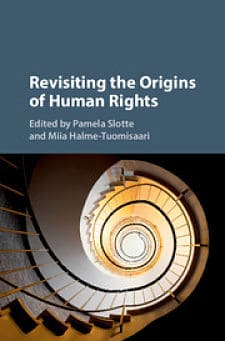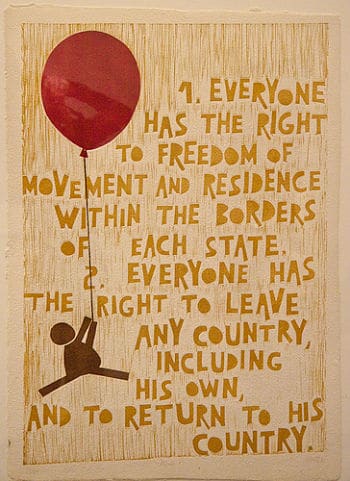To the blind believer in human rights, nothing so messy as history is truly necessary. To question, to complicate, to ‘problematize’ has been thought to come at too high a potential price – namely, the unraveling of a certainty designed to avoid history and so prevent its repetition.
Yet to survive human rights must dive deep into their foundations, the idea’s relationship with law – and inevitably and rightly into their history.
This volume shows how thrilling but at the same time destabilizing this can be.
 Various common themes have bubbled to the surface of the work through the different perspectives offered by the individual chapters. Most apparent is the depth of the history being opened up. It quickly becomes clear that the phrase human rights has been with us longer than we might have imagined.
Various common themes have bubbled to the surface of the work through the different perspectives offered by the individual chapters. Most apparent is the depth of the history being opened up. It quickly becomes clear that the phrase human rights has been with us longer than we might have imagined.
Kathryn Kish Sklar’s recovery of the eighteen women’s rights conventions held in the US between 1848 and 1870 shows how the activists behind this movement for change ‘spoke of “human rights” and “women’s rights” as two sides of the same coin’.
Dzovinar Kévonian’s study of Andre Mandelstam as the ‘founding father of international human rights’ is another example of the reach of this language well back beyond the watershed year of 1948. Pamela Slotte’s contribution traces the relationship between the UDHR and religious sentiment.
In these chapters the terminology of human rights is to the fore, the authors showing themselves well aware of ‘the linguistic turn in the human sciences’, which leads them to ‘insist that the meaning of recourse to “rights” is to be determined from within the – political, legal, philosophical – vocabularies within which the expression appears’.
But what happens when the phrase ‘human rights’ has disappeared altogether?
Here is the first creative tension we may observe when reflecting on this book’s cumulative effect, the need to trace a human rights narrative on the one hand and, on the other, the necessity of breaking free of the exact language of human rights in order better to be able to do this.
Taina Tuori is perhaps clearest on this, in her ‘From League of Nations mandates to decolonization’. The mandate system has ‘dropped entirely outside the human rights narrative’ and in recovering its role, it becomes necessary ‘ to examine specific topics of what we would today recognize as human rights concerns (land tenure; slavery; forced labour; women; and others).
So how much must we limit the study of human rights?
Jacob Giltaij and Kaius Tuori’s discussion of ‘Human rights in antiquity? Revisiting anachronism and Roman law’ leads them to a ‘more open-ended concept of human rights’, one which engages with ‘equality-based thinking’ however it is (contemporaneously) described.
Is this cheating, turning the history of human rights from a field limited by the use of a particular language into one that threatens to cover the whole of the ethical spectrum, down the ages?
Hardly, not only because the term is not itself definitive of any settled meaning but also because the abstract ideas we say we can detect behind it can lead us into interesting areas of what we effortlessly intuit to be genuine human rights inquiry.

Viewing human rights in this more open way, it becomes possible to share Virpi Mäkinen’s view that ‘natural, individual rights are the outcome of a long legacy of theorizing going back to the high Middle Ages’ – and (we might add) indeed beyond that to: it depends on what you are looking for.
Indeterminacy can only go so far, however.
Does this mean that the ‘constantly changing’ nature of human rights discourse noted by Hunt can sometimes operate to the detriment of the human rights core that we have just identified as crucial (whether we use the term or not)?
The answer this volume suggests is undoubtedly yes. Freed of the historical demands of blind faith, many of the writers here find a harnessing of our field by forces that at best skirmish with what we might call core human rights values, at worst bypass them altogether.
This is the second tension to emerge here, between the ostensible claims of rights-talk and the power that drives such conversations.
It has been the fear of rights being used to sustain oppression that has driven socialist hostility to rights (though as Gregory Claeys shows in his ‘Socialism and the language of rights’ economic rights can be rescued as a field of enquiry [and agitation] for the Left once the Marxian shadow is successfully escaped).
Miia Halme-Tuomisaari’s contribution is highly critical of the elite world of international human rights and the ‘contemporary elitist reality’ that drives the subject. A rich account of human rights cannot avoid tough questions about true ownership of the field, its vulnerability to capture by those who want to add a dash of ethics to their already extensive repertoire of prosperity.
Unavoidable here is also a confrontation with nationalism and its partner in- human-rights-crime, imperialism. Benton and Slater’s chapter takes us beyond the nation state to other ‘visions of order’ that have tended ‘to organize rights talk’. Their analysis of the power of tobacco interests has a contemporary resonance with its observation that ‘references to rights could paradoxically serve to buttress imperial authority at the expense of individuals’.
Kévonian’s reflections on early examples of ‘humanitarian interventions’ are not dissimilar. Even the retrospectively sanctified Universal Declaration of Human Rights is revealed by the US records discussed by Oliver Barsalou to have been infected by the ‘ideology, power politics and the protection of US national sovereignty’.
Martin Ceadel’s discussion of ‘The peace movement and human rights’ makes unsettling connections between the deployment of the language of rights and the pursuit globally of narrow national interests. As he dispiritingly notes ‘peace as an ideal is now in conflict with human rights’ because ‘especially since the end of the Cold War’ such rights ‘are encouraging the replacement of war-prevention as the primary political goal with a modern form of crusading’.

But what of our assumption that human rights is pacific in its thrust? A third tension thrown up by the chapters is that between human rights and violence.
Our subject has both eschewed violence while depending on it to make ethical progress: the revolutionary fervor of first the American colonies and then France; the emancipatory subversion of the colonially oppressed; and (in a milder form it is true) the direct action, civil disobedience and vehement engagement that marks out many of the human rights movements of the last fifty or so years.
To Lynn Hunt ‘[h]uman rights are revolutionary’. Furthermore ‘[i]t is vital to emphasize the revolutionary character of rights because many would like to forget this association’. Samuel Moyn notes his subject Mazzini’s ‘tolerance of violence’ did not impede ‘the quick and far-flung global radiance’ his thought once enjoyed.
There is a strong contrast here between those who view human rights as doing good and those who see them as a vehicle for the assertion of entitlements against power. The power of the language of human rights has been its ability to draw both kinds of engagement under the same umbrella, to provide a formula around which both the givers and the takers can coalesce.

There is a wider truth here about the amorphousness of human rights, a characteristic that is both at the root of why it succeeds as a term and at the same time explains how difficult it is for any historical narrative to tie it down.
These chapters embrace rather than disown this uncertainty, finding in their various stories evidence of human rights themes at work in a way that is often explicit but at times (only) implicit, that is sometimes reflective of malign power relations but more often liberating of the human spirit, that (however it is presented from chapter to chapter) is always richly rooted in specific moments from the past.
Human rights need this kind of frank engagement if they are to move to a new level of seriousness, both intellectually and in terms of practice.
*******************
This post is an abridged version of Conor Gearty’s afterword to Revisiting the Origins of Human Rights.





